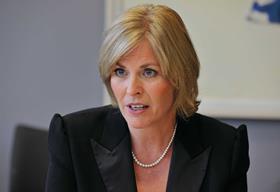Firms should include partners in their statistics on employee pay to give a more accurate picture of gender disparities, the vice-president of the Law Society has said, as Chancery Lane releases the findings of what is believed to be the largest survey ever conducted on women in the law.
Announcing the survey results on International Women’s Day last week, Christina Blacklaws was asked about partners’ pay in relation to mandatory gender pay gap requirements. At present, only salaried partners have to be included, meaning that the highest earners – most often men – do not appear in the figures.

Blacklaws said the Law Society’s approach to gender diversity and inclusion issues is a mix of transparency, engagement and openness. She stressed she would not want to be judgemental about other businesses but added: ‘This is my personal view – I think it would be welcome if law firms did decide to undertake their gender pay gap review for everyone within their business. I think we could really use that information effectively then.’
According to the Society’s survey, which attracted nearly 8,000 responses, 60% of 6,533 people who responded to specific questions on gender pay gap reporting requirements said they were aware of a gap in their organisation – but only 16% reported steps being taken to close the gap.
Unconscious bias is perceived to be the main barrier to career progression, followed by an unacceptable work/life balance to reach senior levels, and men dominating traditional networks and routes to promotion.
One in 10 respondents said unconscious bias training is being carried out consistently in their organisation. Nine in 10 respondents think a flexible working culture is critical to improving diversity, and 37% work in organisations that have a flexible working provision but which is not consistently enforced. One in 10 work in organisations that have no such provisions.
As part of a wider programme of work to promote gender equality, the Society will host 100 roundtables between July and October. Chancery Lane will also produce a toolkit, which will include ‘activism pieces’ on, for instance, women in history. Blacklaws said: ‘We’re asking women to go back into their business and firms, and share a lot of the firsts.’



























No comments yet